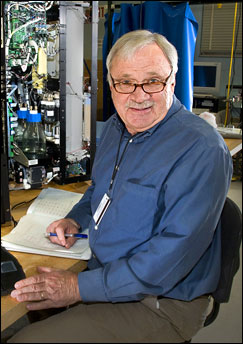Peter Daum Named Chair of Brookhaven Lab's Environmental Sciences Department
January 20, 2010
UPTON, NY &mdash Peter Daum has been named chair of the Environmental Sciences Department at the U.S. Department of Energy’s Brookhaven National Laboratory, effective January 1. A senior scientist at Brookhaven, Daum has been acting chair of the department for the past two years.
With 60 employees and an annual budget of $20 million, the Environmental Sciences Department has programs in atmospheric physics and chemistry, carbon-cycle research, plant ecology, and tracer technology programs with applications in energy efficiency, meteorological science, and national security. These research programs respond to the Department of Energy’s mission to study the transport and fate of energy-related pollutants and the effects of those pollutants on global climate.
“I am looking forward to developing new programs to explore climate change,” Daum said. “Secretary of Energy Chu views understanding all aspects of global warming as a science priority, and my department will be vigilant in undertaking strategic research programs to understand all the factors that have led to an increase in global temperature as well as how fast it may be increasing. This research is focused on development of new insights into how best mitigate the problem.”
The Environmental Sciences Department is currently participating in a multi-institutional project called FASTER (Fast-physics System Testbed & Research) aimed at accelerating the evaluation and improvement of the representation of fast physics processes – processes, such as precipitation of cloud formation, that occur on short timetables – in climate models. The 50 scientists in the project will be using data collected by the Department of Energy’s Atmospheric Radiation Measurement Climate Research Facility since the early 1990s at locations from the tropics to the southern Great Plains and the Arctic for evaluation of the performance of these new representations in models of various scales. New York Blue supercomputer, based at Brookhaven Lab, will be an important resource for conducting these evaluations.
In the near future, scientists in the Environmental Sciences Department are planning to study the effects of rising carbon dioxide and temperature on the Arctic tundra by conducting controlled temperature and carbon dioxide-enhancement experiments. Much of the carbon in the tundra remains inactive because it is captured in the permafrost, but if the area continues to warm, a large amount of carbon could be released to the atmosphere, which could potentially accelerate a rise in the global temperature.
Daum earned a B.S. in chemistry from Drexel Institute of Technology in 1965, and a Ph.D. in chemistry from Michigan State University in 1969. He was on the faculty of Northern Illinois University from 1969 to 1980, and visiting professor at the University of North Carolina at Chapel Hill, from 1978-1979. He joined Brookhaven Lab in 1980 as a chemist in the Atmospheric Sciences Division, and he served as head of that division from 2000 to 2008. In January 2008, he became acting chair of the Environmental Sciences Department, and he was promoted to senior scientist in October 2008.
Daum’s scientific work at Brookhaven has focused on the effects of energy-related pollutants on the atmosphere. His principal areas of study have been smog, acid rain, and the climate effects of aerosol. Daum has been a lead scientist in several major field studies, including an investigation in 2008 of the microphysical properties of marine stratus clouds off the coast of Chile. Daum has served on numerous scientific review panels, and is currently a member of the Department of Energy Atmospheric Sciences Implementation Team and the National Science Foundation Facility Review Panel. Daum received the Southampton College Environmental Leadership Award for his research in atmospheric sciences in 2002.
2010-11068 | INT/EXT | Newsroom










